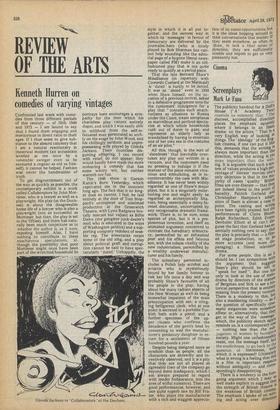Kenneth Hurren on comedies of varying vintages
Confronted last week with comedies from three different periods of this century — of 1910, 1946 and 1973 — I am 'bound to say that I found them engaging and meritorious in direct ratio to their ages. If I thus seem to give substance to the absurd calumny that I am a natural reactionary in theatrical matters (an accusation levelled at me once by a venerable swinger even as he savoured a cognac as old as himself), it cannot be helped. Fashion was never the handmaiden of truth.
To get disgruntlement out of the way as quickly as possible, the contemporary exhibit is a work called Collaborators by John Mortimer, who is a lawyer as well as a playwright. His play (at the Duchess) is about the disagreeable home life of a lawyer who is also a playwright (not as successful as Mortimer, but then, the play is set in the 'fifties), and there has naturally been much conjecture as to whether the author is, as it were, exposing himselt. Alas, 1 have nothing to contribute to these mischievous speculations, although the possibility that poor Mortimer might once have been part of the wretched household he portrays here encourages a sympathy for the man which his charmless play cannot entirely dispel, and which I was easily able to withhold from the self-infatuated man personated so archly on the stage by John Wood, and his chillingly sardonic and unprepossessing wife played by Glenda Jackson. Their countless disgusting offspring, I can record with relief, do not appear; they would hardly have made the more endearing a comedy that has some wintry wit, but neither warmth nor fun.
The 1946 show is Garson Kanin's Born Yesterday, which captivated me in the innocent long ago. The fact that it no longer does so cannot, I feel, be laid entirely at the door of Tom Stoppard's uninspired and mistimed production at the Greenwich Theatre, with Lynn Redgrave brutally miscast but valiant as Billie Dawn (the gangster-junk-dealer's moll who is educated in the ways of Washington politics) and a supporting company redolent of seaside rep. The wisecracks retain some of the old zing, and a play about political graft and corruption cannot be said to have spectacularly 'dated.' Unhappilly, the
style in which it is all put together, and the earnest way in which its ' messages ' in favour of ' democracy are ;delivered by the journalist-hero (who is nicely played by Bob Sherman but cannot help sounding like the editorial page of a bygone liberal newspaper called PM) make it an oldfashioned play that is not quite ready to qualify as a period piece.
That the late Bernard Shaw's Misalliance (in repertory with Cowardv Custard at the Mermaid) is 'dated' is hardly to be denied. It was as 'dated' even in 1930 when Shaw himself, on the occasion of a previous revival, asked in a defensive programme note for the customers' indulgence for a play that "contains such anachronisms as allusions to Russia under the Czars, treats aeroplanes as marvellous and perilous spectacles at which whole households rush out of doors to gaze, and represents an elderly lady as scandalised by having to entertain one of her own sex in the costume of an air pilot."
All this, though, is the sort of datedness ' that inevitably overtakes any play not written in a vacuum, and the customers need no pressing to indulge it if the manner of the piece remains vivacious and stimulating, as is incontrovertibly the case with Misalliance. It has never been widely regarded as one of Shaw's major plays, but it is a singularly entertaining one and might easily be regarded as archetypically Shavian, being essentially a many-faceted discussion, uncorrupted by any recognisable dramatic framework. There is, to be sure; some species of plot, but it is a preposterous invention, and itself an animated argument concerned to contrast the hereditary aristocracy, personified by an exhausted peer and his effete and fatuous son, with the robust vitality of the new industrialism, personified by a wealthy underwear manufacturer and his family.
The subsidiary personnel includes a Polish lady acrobat and aviatrix who is mysteriously bound by her family honour to risk her life once a day and was probably Shaw's favourite of all the people in the play, having about her many radiant aspects of the New Woman as well as being somewhat impatient of the male preoccupation with sex; a cringing belligerent clerk, who at one point is secreted in a portable Turkish bath with a pistol; and a further specimen of the upper classes who confirms the decadence of the gently bred by consenting to wed the manufacturer's predatory daughter in return for a settlement of fifteen hundred pounds a year.
Despite being designed more as symbols than as people, all the characters are shrewdly and in ventively observed, and it is a pity that they are not all played as agreeably (two of the company go beyond mere inadequacy, which I am always prepared to regard with tender forbearance, into the area of wilful nuisance). There are good performances, however, and
one quite superb one by Bill Fraser, who plays the manufacturer with a rich and waggish apprecia-. Spece tator April 28, 1973 tion of its comic opportun ities; but it is the ideas hopping around in their conversations that matter If they seem somehow, as often in Shaw, to lack a final sense of direction, they are sufficiently nimble and impish to get us veil pleasantly lost.


































 Previous page
Previous page